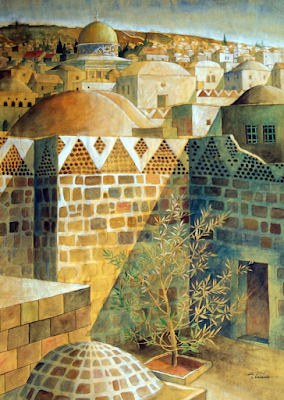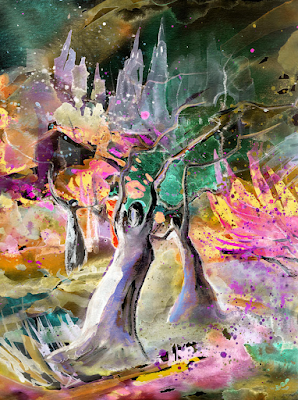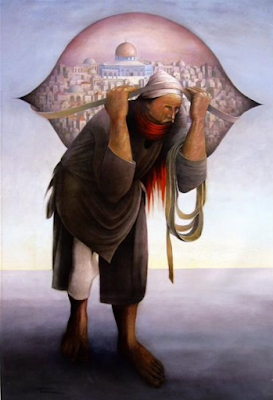The Muse of Lament and Dissent IV
 |
| Weeping Madonna (with credit to Sara Spaulding Phillips) |
Introduction
My name is Ozymandias, King of Kings,
Look on my Works, ye Mighty, and despair!
Nothing beside remains. Round the decay
Of that colossal Wreck…
—Shelley
Haunted August, 2025
August was the month in which, in 1933, my mother, her sisters and parents, fled Germany by train on mother’s 13thbirthday. It was also the month, five years later, that my parents were married, in Holland, in 1938, just before Hitler invaded, just before my grandparents, aunts, and parents fled Europe by ship. Since Jews were not welcome in America, the family disembarked in Cuba and waited in Havana for 18 months, until by some unknown sleight of hand, my grandfather procured Haitian passports, which somehow allowed the family to enter America, in 1940. I’m still mystified by how all this happened.
85 years later, my ancestors haunt me, in turmoil and agony, as America, their Promised Land, dives down into its darkest shadow, on its way to becoming the “colossal Wreck” Shelley describes in his famous sonnet—a shattered statue, found in the desert —of the once powerful King of Kings, Ozymandias, better known as Ramses II. \ “Empires rise and empires fall,” my ancestors chant. They insist I face the unbearable truth, that the country that saved our family, is going the way of the country they fled. They recognize the symptoms, as the Berserker turns into the Gaslighter-in-Chief, telling Big Lies, disappearing ethnic minorities, appropriating the “Jewish Problem” for his own ends.
August began with the news that UCLA’s scientific research funds were to be frozen by the National Science Foundation to punish the University for Antisemitism! Say what? Chancellor Julio Frenk, whose Jewish family fled Nazi Germany just like mine did, was the recipient of a letter with this news! Is this some sort of cosmic joke? My ancestors are not amused. Neither was Governor Newsom who said, on August 1:
Freezing critical research funding for UCLA dollars that were going to study invasive diseases, cure cancer, and build new defense technologies makes our country less safe. It is a cruel manipulation to use Jewish students’ real concerns about Antisemitism on campus as an excuse to cut millions of dollars in grants that were being used to make all Americans safe and healthy.
The voices of my ancestors grew louder and more agitated, when, on August 11, the Berserker revealed his Gaslighter-in-Chief persona, declaring a “crime emergency” in Washington D. C., even though crime is down in that city, as well as in big cities across the country. He has deployed the National Guard and armed them with guns. They are not trained to work with civilian populations. They stand around in tourist locations available for selfies. But they are not available to neighborhoods who might genuinely need their help. We remember them standing around, not knowing what their role was, in Los Angeles in June. We saw the fear and anger in the eyes of Angelinos, especially Latinos. Now the Gaslighter is threatening other blue cities: Chicago, Oakland, New York, Baltimore. What do they have in common? Black mayors! Large, vibrant Black communities. “Woke” politics. The Gaslighter wants to put us all to sleep, into a state of denial about the huge black hole his ship of state is headed toward. Having rid the country of so many immigrants whose labor feeds, clothes and cares for us, is there going to be more racist ethnic cleansing in our great cities? What will happen to our economy? Our schools? Our businesses? Our friends and neighbors? Is he going to come after the Jews? Will the National Guard with its guns be deployed to liberal areas just before an election? Or will it be deployed to deny our rights to free speech and to gather in protest? The spirit of my mother remembers that Hitler came to her town when she was twelve. She and a group of her Jewish classmates agreed they would not make the Hitler salute, though they knew their refusal was dangerous. “In times like these” I hear her say, “courage is essential.”
A remarkable show of courage came to inspire me and my ancestors. Kilmar Abrego Garcia, who had been stolen from his family and his life by the Berserker’s ICE agents, who accused him, falsely, of gang membership, was sent, despite protests from judges who noted the lack of evidence and due process, to a hell hole prison in El Salvador, where he was tortured. Then he was brought back to the U.S. with another false accusation—human smuggling. The Berserker says he will be deported to Uganda, a country with which Garcia has no ties. A judge has ruled that he cannot be deported until he’s had due process. Garcia spoke to a group of his supporters in Spanish, asking that they promise to pray, with love, not just for him but for everybody, and to continue to demand our freedom. His courage, and the generosity of his prayer, help calm me and my ancestors. If, given all he has suffered, he can reach into our hearts and souls and help us stay awake to the terrible danger he and we are in, perhaps we can face what haunts us.
Commentary on the poem “What We Build:”
“Dawn saunters over the horizon” sets the meandering tone with which Sheila deShields opens her haunting narrative poem, suggesting ease at the beginning of a new day. But by the next line this mood is undermined as dawn reveals “her chipped teeth and gray pearls.” Where are we? Our scene–shifting storyteller says we are on a ridge— “a migration path for golden eagles/red–shouldered hawks and peregrine falcons.” Then suddenly we find ourselves aloft in “the evergreen holly oak next to the curb” where “two Anna’s hummingbirds nestle ready to fledge” at “the edge between what–is–city and the unincorporated.” A few stanzas later we stand in awe, gazing at “Mount Umunhum on the western horizon// ‘resting place for the hummingbird’/named by the Ohlone for the One Who Brought Fire.”
It dawns on me that in these opening stanzas our storyteller has taken us deep into indigenous consciousness: We’ve looked to the east at the breaking dawn; we’ve looked up at the trees to see birds in their homes; we’ve looked north to the city, looked south to the suburbs; we’ve looked west to Mount Umunhum; we’ve looked down to the ground where the silver–gray fox trots, and down down to the Realm of the Ancestors, who tell the story of “the One Who Brought Fire.” I recognize this as the opening ritual—“Calling the Directions”—practiced by tribal peoples. We name where we are—on sacred ancestral ground—with gratitude for the new day and for the ancient gift of fire.
Like her indigenous ancestors, the storyteller observes the movements of animals. Silver fox, with whatever she’s hiding in her mouth, must navigate “the new retaining wall,” and rabbit must navigate the deck, in the realm the poem’s title names: “What We Build.” Our storyteller watches all this drama from “inside/next to the glass patio door…sitting in her “new armchair-writing-spot.”
She shifts from the animal realm to tell the human story of “three weeks of disruption” created by the building of a wall and haunted by the legacy of her late father. His gift to her of beautiful Hackett rock—a special flagstone with warm colors—has been transported from her family’s land in eastern Oklahoma to her California home in a major feat of planning and building “a 142-linear-foot-retaining wall.”
The poem meanders through epochs and landscapes, as the retaining wall with its gift of support to the “crumbling hill” and its promise of a vineyard “long-dreamed” by her husband meanders through rabbit’s disturbed habitat, and through the story teller’s memories of how her father’s “stone business” became hers. She imagines the three-foot-high wall as a sitting place for a garden party, and a place where “grandchildren can walk arms like windmills for balance.” What has been built is a hospitable wall, which brings her father’s presence from Oklahoma to California—a haunting that is a blessing, and a joy for his descendants.
As the tone of the first line of this poem is undermined by its second line, the reverent tone of the first section of the poem turns fearful and outraged in the second section. The ancestral and familial legacy of “What We Build,” what we hold holy, is rudely subverted by the unholy and cruel machinations of “the Destroyer”—whom “we humans have chosen” to lead us. How did this hell realm, in which immigrants and civil servants disappear, take over our land? By what sleight of hand has the inhospitable wall “the Destroyer” has built—"18 to 27 feet high patrolled bars southern neighbors out”—come to define us?
Our storyteller makes a powerful turn with the image of the “Colossal Wreck” and her prophesy that the Destroyer’s “transient creations/fall like stone pulverized into lone and level sands.” The italicized words are quoted from Shelley’s great sonnet, “Ozymandias,” which, as she explains in her note, “speaks to the fleeting nature of power and human achievement.”
Having done away with our contemporary Pharoah, the storyteller returns to her beloved backyard, inhabited by her friend the rabbit, and advises: “run, rabbit, run.” In myth and symbol rabbit is associated with the moon, fertility, and shape-shifting Mercurious. Perhaps it takes a trickster to deal with a trickster. The storyteller invites rabbit to return, and ends with a prayer which values the natural world—a prayer we all can join:
May we value one another and the ground beneath our feetmay we be grateful for the air we sharemay we help one another facewhat devours.
 |
| “Mount Umunhum at Dawn” |
what we build
Poem and Images by Sheila deShields
i.
Dawn saunters over the horizon
with her chipped teeth and gray pearls
on one spring day
in the suburbs
along a ridge a migration path for golden eagles
red-shouldered hawks and peregrine falcons
while in the nest of the evergreen holly oak next to the curb
two Anna’s hummingbirds nestle ready to fledge
 |
| “Ready to Fledge” |
outskirts mind you
the edge between what-is-city and the unincorporated
miles from downtown
a site of no known historical impact
and yet from the highest evergreen ash at the top of the berm
you can see Mount Umunhum on the western horizon
“resting place for the hummingbird”
named by the Ohlone for the One Who Brought Fire
when suddenly
a silver-gray fox with rufous sides
tail bushy like a cat’s
hastens behind and over a new retaining wall
her dogtrot says
she’s hiding something perhaps a hummingbird in her mouth
and then on the deck a young rabbit appears
and races across the compressed wood
streaks back
from who-knows-what
while i inside
next to the glass patio door
sit in my new armchair-writing-spot
as still as my bonsai ficus
 |
| “Writing Spot” |
for i relish this company
missed during three weeks of disruption –
construction using Hackett rock
stacked idle on twelve pallets for a decade
and now a 142-linear-foot retaining wall
that curves along the bottom of the berm
and though many of the hiding places for the white-tailed rabbit are gone
the stones turned on their sides fold into meandering grace
in a warm pattern of ochre, browns, and honey
topped by a long ledge of golden Dark Cameron capstone
from eastern oklahoma delivered on a semi what I would call a large surprise
the Hackett was a gift from my father
within the year he was gone
his stone business mine to manage for a decade
at last i can view his legacy
lifted and shaped by a master mason
 |
| “Dad’s Hat on the New Wall” |
this wall useful as a brace for a crumbling hill
a boundary for the vineyard-to-come long dreamed by my husband
this border at mid-point has pillars which open onto winding steps
that lead up up to the first tree we planted here
we are grateful
for our long-awaited wall though only three feet high
where a garden party of friends and family may sit
where grandchildren can walk arms like windmills for balance
where part of our Oklahoma land
sustains
and now Dawn gives way to Joy with her weathered tan cowboy hat
a garden girl she dances on stone
ii.
Rabbit what did you see what sent you back into hiding
it wasn’t the wall or me
perhaps your Scary equals the Destroyer we humans have chosen
run, rabbit, run
his wall 18 to 27 feet high patrolled bars southern neighbors out
he claims Panama Greenland Canada
he promises to mine in international waters
he holds workers and branches of government by the neck “early retirement plans”
while American citizens are transported to another country’s prison –
is anyone safe?
while within our borders
he wields the highest court in his open palm
as he speaks of a third term with expanding power
 |
| “Colossal Wreck” Online Image* |
and his words
changeable as a wall without mortar transient creations
fall like stone pulverized into lone and level sands
in our backyard small rabbit
come back when you can
may we value one another and the ground beneath our feet
may we be grateful for the air we share
may we help one another
face what devours
 |
| “Run, Rabbit, Run” |
*The online image of a “Colossal Wreck” is the visage of the powerful and prosperous ancient Egyptian pharaoh Ramesses II (who ruled from 1279 to 1213 BCE) and is referenced in Percy Bysshe Shelley’s sonnet “Ozymandias.” Shelley’s poem speaks to the fleeting nature of power and human achievement and includes the line “into lone and level sands.” The statue and its temple, forgotten, have fallen into the desert.
Bio
When I chose Percy Bysshe Shelley as the subject of my undergraduate honor’s thesis in Oklahoma, and then later for my graduate master’s thesis in Wales, my studies culminated with access to Shelley’s originals in The Bodleian at Oxford. I was inspired by his lyricism but also by his essay on the Defence of Poetry. He conveyed why words matter, namely, why we must pursue Truth and Beauty and speak against tyranny. The early nineteenth century words of this master poet resonate within our own time.
In my current life, I balance managing the fourth-generation family ranch in Oklahoma with my work as a trustee in the Bay Area of California. Once a satellite software systems engineer, I am a founding member of Hedgebrook Sisters Writing Group, a recipient of Hedgebrook and Rotary International Fellowships, and a Deep River Poet. Every morning I wake to see our wall built with my father’s stone, and I feel grateful for my connections to the land, my ancestors, and the writers who nurture the planet and our humanity.

%20Between%20Two%20Worlds.png)
%20%E2%80%9CGenesis%E2%80%9D.png)
%20%E2%80%9COffering%E2%80%9D.png)

























%20%20%20Juhaina%20Habibi%20Kandalaft.png)
